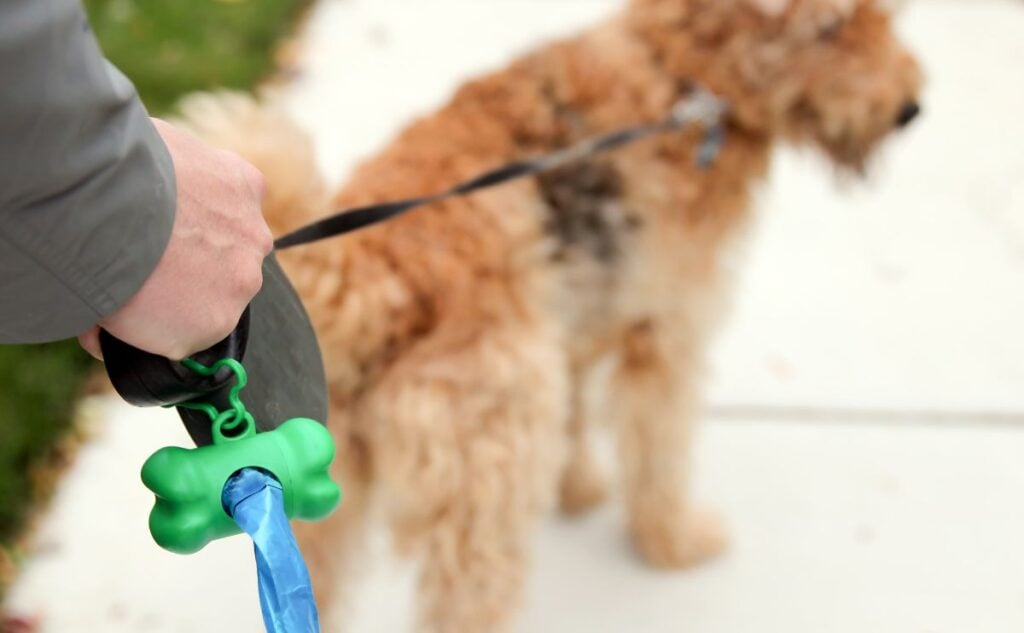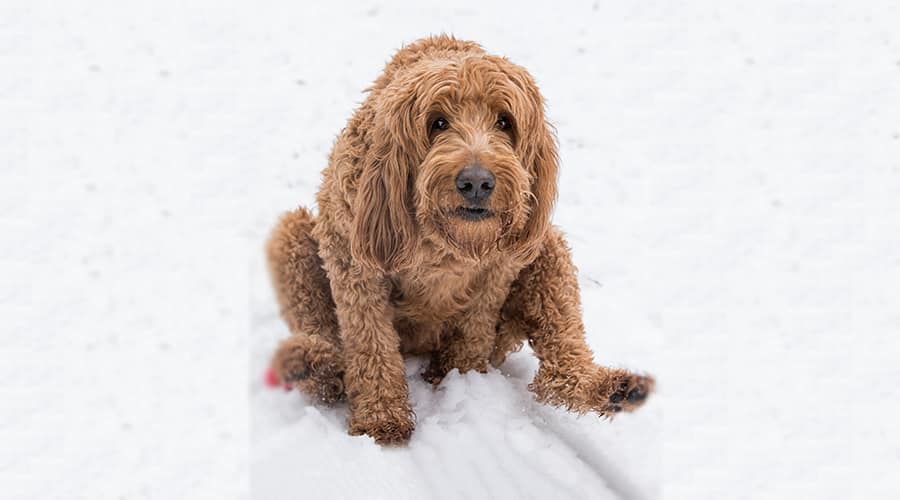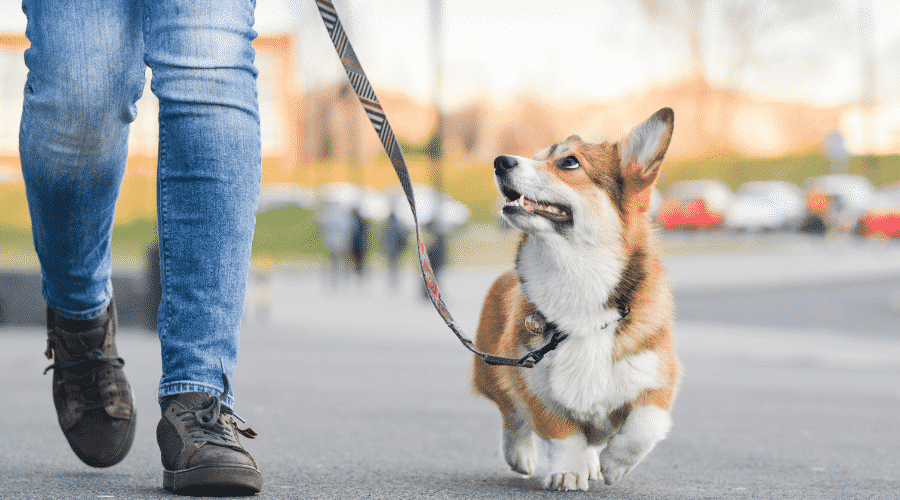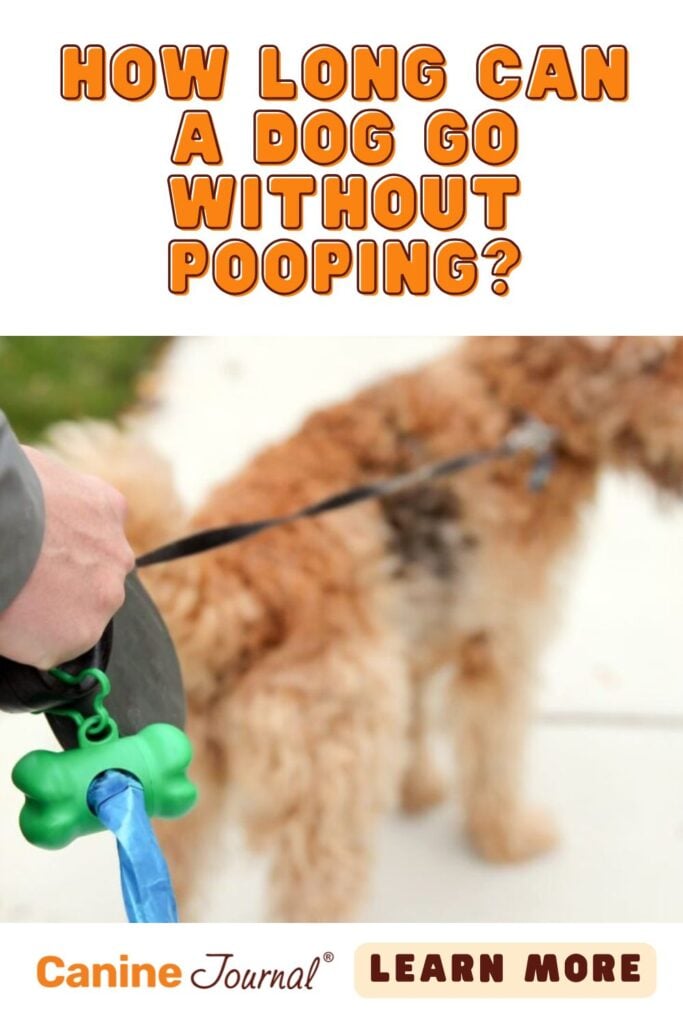Help! My Dog Hasn’t Pooped In 3 Days. How Long Can A Dog Go Without Pooping?
When you purchase through links on our site, we may earn a commission. Here’s how it works.

Most of us dog owners know our furry friend’s potty routines all too well. Maybe yours, like my pup Tiny, drops a deuce twice a day like clockwork. Or you could have one that saves it up for a massive daily dump. But what if your pup suddenly abandons their normal pooping schedule? Does that mean something’s wrong?
Table of Contents
In most cases, skipping a poo or two isn’t a big deal. However, canine constipation is no joke, and it can happen to any dog. How long can a dog go without pooping? And when is it time to contact your veterinarian — even if your dog seems fine otherwise? I’ll answer these questions and more to help you figure out what may be going on with your furry friend.
How Long Can A Dog Go Without Pooping?
Pups get blocked up for many reasons, and in most cases, it’s a temporary occurrence and nothing to worry about. But some instances are a cause for concern — especially if too much time passes without having a bowel movement.
But how long is too long? The general consensus in the veterinary world is if your dog hasn’t defecated in more than 48 hours (although some say 72 hours), it’s time to consult your vet. The reason? Your furry friend could have a serious underlying medical condition that needs quick veterinary attention and treatment. After all, our pups can’t tell us what they’re feeling, so it’s important to have a vet check them out to be on the safe side.
What About Problems Pooping After Surgery Or Illness?
It’s common for dogs to go a few days without passing much feces after undergoing surgery or recovering from an illness, like a bout of diarrhea. In these cases, your pup likely hasn’t eaten much or exercised regularly, so it can take some time for their bodies to get back into their normal pooping routine. Also, certain medications used for anesthesia and pain management, as well as antibiotics, can temporarily slow down or disrupt the gastrointestinal tract.
What Are The Signs Of Constipation In Dogs?

In addition to not defecating for two or more days, here are some other symptoms of constipation in dogs.
- Straining or whimpering while trying to defecate (can also be a sign of diarrhea)
- Circling excessively, scooting, or squatting frequently
- Very small, hard stool that looks like pebbles
- Only releasing minute amounts of watery feces with or without mucus
- Decreased appetite
- Vomiting
- Lethargy
What Causes Canine Constipation?

It’s important to understand what can cause our pups to become constipated. Sometimes, it’s fairly easily remedied with some home care, but on the flip side, it could be an indication of a severe or even life-threatening health problem. That’s why it’s so important to contact your veterinarian.
- Insufficient fiber in the diet
- Sudden change in dog food
- Swallowing objects that cause an intestinal blockage
- Dehydration
- Lack of exercise
- Impacted anal glands
- Intestinal disorders
- Kidney problems
- Hernias
- Enlarged prostate
- Digestive tract tumors
- Tumors or masses around the anus
- Endocrine diseases, such as hypothyroidism
- Spinal pain
I spoke with Dr. Rebecca MacMillan, BVetMed, BSAVA, PGCertSAM, MRCVS, a companion animal veterinarian and surgeon in England, about her experiences with canine patients in her practice. “I find that dogs usually become constipated either because of an inappropriate diet or an underlying health complaint,” she shares. “Many different health problems can cause constipation, but a common one I see is dehydration. This can occur due to digestive upset, kidney disease, or other ill health, leading to smaller, firmer stools.”
Dr. MacMillan also sees constipation problems in some dogs with arthritis. “In my experience, dogs with arthritis may struggle to adopt the right position to pass stools, and when coupled with a lack of exercise, this can lead to serious problems. Plus, I have seen many dogs become constipated due to physical obstructions in their digestive tract, such as foreign bodies, tumors, or hernias.”
Keep An Eye On Older Dogs
Older dogs are at a higher risk for constipation because their metabolism and digestive process tend to slow down as they age. Senior pups may also not be getting the adequate exercise needed to help the GI tract perform optimally. Switching to an age-appropriate diet may help. See our reviews of the best dog food for seniors.
What If My Dog Hasn’t Pooped But Is Acting Normal?

If your dog hasn’t pooped but is acting completely normal, it’s likely not a major cause for concern. Still, you can try to encourage them to go by increasing their water intake, giving them more exercise, and adding a small amount of fiber to their food like canned pumpkin; however, if they haven’t pooped for more than a couple of days and are showing signs of straining, lethargy, or loss of appetite, consult your veterinarian as it could indicate constipation or a more serious issue.
My Dog Hasn’t Pooped In 4 Days: Is That An Emergency?
Yes, if your pup hasn’t defecated at all in more than 3-4 days, that can be an emergency, so take your pup to your veterinarian or an emergency clinic immediately. Why is this so dangerous? In addition to being a possible sign of a life-threatening blockage from a foreign object or another serious underlying medical problem, prolonged constipation can lead to what’s called obstipation or even a severe condition termed megacolon.
Obstipation involves the build-up of so much fecal matter in the colon that it becomes compacted, dry, and hard, and a dog cannot defecate at all. According to Veterinary Partner, this typically requires a de-obstipation process, which involves giving the dog IV fluids and one or more enemas to loosen up the fecal mass. Then, the dog is put under general anesthesia, and the mass is “milked” out of the colon by hand.
Left untreated, the impaction can fill up the entire length of the colon, which can put too much pressure on the intestinal wall. This pressure may result in megacolon, a condition in which the colon’s muscles have stretched so much that the colon becomes permanently enlarged even after the impacted feces have been removed.
In some cases, megacolon can be managed medically for the rest of the dog’s life with a special diet and prescription medications, but it can also require a surgical procedure called a subtotal colonectomy. While megacolon is more common in cats, it can still occur in our canine companions.
A Vet’s Personal Experience With Obstipation
One memorable case I saw was a young adult Bulldog who was brought to the practice because she was vomiting and subdued. Her owners reported that she also hadn’t passed stools properly for several days. On examination, I could feel a large firm structure in her abdomen, and I suspected impacted feces. I took x-rays, which confirmed this, and I was able to rule out other issues, such as a foreign body.
This dog was so badly constipated that she required an enema under general anesthetic to remove all the hardened fecal material and effectively ‘unblock’ her. She also required fluids to correct the dehydration she had developed from vomiting. After this, she felt so much more comfortable, and her symptoms resolved.
It turned out that her owners had been feeding her an inappropriate home-formulated diet that contained a lot of bones and was very low in fiber, leading to her constipation issues. They were instructed to change her diet immediately to avoid problems from happening again in the future.
This dog demonstrates perfectly the sorts of issues that can occur if your dog is not able to poop for 3 or 4 days. The longer the stools stay in your dog’s colon, the more dried out and hard they become. This causes pain, vomiting, and a reduced appetite. In extreme cases, your dog could even develop megacolon, a condition where their large intestine becomes stretched and damaged. If your dog is struggling to pass stools and seems unwell, you must contact your vet immediately.
– Dr. Rebecca MacMillan, Small Animal Veterinarian & Surgeon
Consider Pet Insurance

Unexpected accidents and illnesses, like severe constipation, can arise at any time, and many can cost you hundreds and even thousands of dollars in vet bills for diagnostics and treatment. For example, the cost for an intestinal blockage can range from $800 to $7,000, depending on the extent of damage. However, pet insurance can help cover a significant portion of your vet expenses. Getting your pup insured before any health problems occur is best because providers don’t cover pre-existing conditions. See our expert reviews of the best pet insurance providers to learn more.
How To Help Your Constipated Dog
For mild cases without any serious signs, consider one of these 12 home remedies for dog constipation. Also, check out this brief video where Dr. Marty Greer, Revival Animal Health’s Director of Veterinarian Services, shares some tips on how to relieve constipation in dogs and other important information.
Frequently Asked Questions
Here are some of the most common questions pup owners have regarding dogs not pooping. Yes, you’ll see a theme here. Many owners don’t know how long to wait when their dogs cease relieving themselves, and the period of time can make a difference. Don’t see your question here? Ask me in our comments below or head over to our forums, and we’ll get back to you!
Can I Give My Dog A Laxative For Constipation?
Do not give your furry friend a laxative without first consulting with your veterinarian. If your vet gives you the green light, they’ll recommend ones that are safe for dogs, such as lubricant gels like Laxatone or over-the-counter unflavored Miralax powder. Your veterinarian will give you the proper dosage for your pup. You could also try an all-natural dog-specific stool softener like NaturVet Stool Ease.
How Often Should A Dog Poop?
Many pup owners wonder, how many times a day should a dog poop? There’s no hard and fast rule here. Some dogs poop two or three times per day, while others only relieve themselves once a day. It really comes down to each individual dog’s digestive rhythm.
My Dog Hasn’t Pooped In 24 Hours: What Should I Do?
It can be normal for a dog to go more than 24 hours without doing their business, but if your pup usually poops 2-3 times per day, you should consider giving them canned pumpkin, wheat germ, or some other vet-recommended home treatments. Often, this extra fiber can help get things moving regularly again.
My Dog Hasn’t Pooped In 2 Days: Do I Need To Call My Vet?
If your pup hasn’t had a bowel movement in over 48 hours, it’s a good idea to contact your veterinarian. This is especially true if you’ve tried supplementing your pup’s food with extra fiber without any positive results.
My Dog Hasn’t Pooped In 3 Days: Is This Dangerous?
It could be a serious situation if your pup has gone more than 72 hours without passing any feces. You should contact your veterinarian immediately. I also urge you to read the information above about the potential dangers of prolonged constipation.
How Can I Prevent My Dog From Becoming Constipated?
If your pup struggles with digestive issues, including occasional constipation or diarrhea, you may want to consider switching their food to incorporate more fiber in their diet. See our reviews of the best high-fiber dog food. Another fantastic way to keep your pup’s digestive tract healthy is by giving them probiotics. Our article on the best probiotics for dogs gives you some top-rated products formulated for dogs’ unique gut health needs. Finally, it’s so important that your furry friend has plenty of fresh water and adequate exercise.
Why Trust Canine Journal?
Sally has over 20 years of experience in human health sciences communications, including over 10 years as an expert on pet health conditions and treatment. She has written about hundreds of canine medical conditions and treatments. Sally is part of a team of dedicated canine professionals and long-time dog owners at Canine Journal who spend countless hours researching, testing, and recommending only the best services, health advice, nutrition, dog gear, and more.




